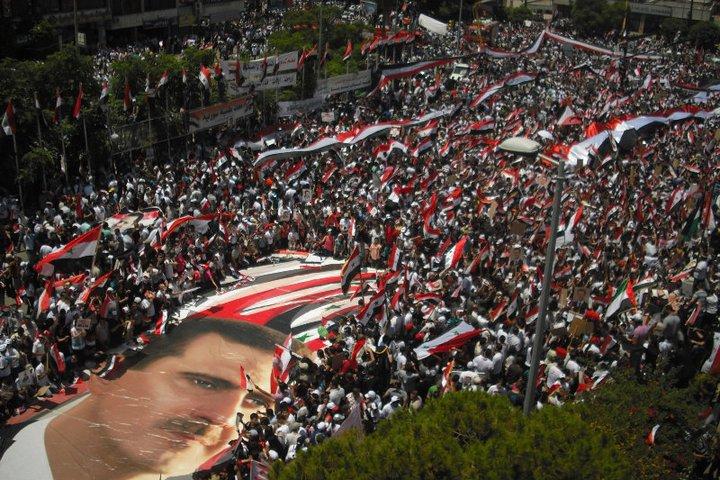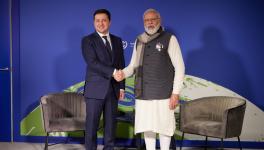The US and Allies Suspend Their “Assad Must Go” Chorus
After 4 years of bloody battles and millions of refugees, the western powers, led by the US, seem to have given up their demand of “Assad must go” as a precondition, and accepted the need for a peace process in Syria that includes Bashar al Assad. The UN Security Council Resolution, passed on 18th December, calling for a peace process and providing a time table, reflects this change. While differences still remain whether Bashar al Assad should or should not contest the elections to be conducted within 18 months, this has now been postponed for the future. The focus is now on a “Syrian led and Syrian owned” peace process.
While the opposition forces which will participate in the talks to be held under UN aegis have not been identified in the Resolution, Da'esh (IS/ISIS/ISIL) and Jabahat al Nusra – the al Qaeda affiliate in Syria -- have been clearly identified as enemies.
The UN Security Council, by its Resolution 2254 on December 18th, endorsed a Syrian Peace Plan that was worked out in the International Syria Support Group. Its contours are:
-
The starting of talks under UN aegis for “a Syrian led political transition” by early January, 2016;
-
Accelerate all efforts to achieve a ceasefire;
-
Establishing a “credible, inclusive and non-sectarian governance” within six months and begin the process of drafting a new constitution;
-
A free and fair elections, under the new constitution and administered under United Nations supervision, within 18 months;
The Resolution further noted that the talks will be held between the Syrian Government and the opposition groups for the above, and all Syrians, including in the diaspora, will be eligible to participate in the elections.
This is indeed a big victory for the Assad government and the Russian-Iranian position. It is also a reiteration of the Geneva Communique of June, 2012, which had identified almost exactly the same steps. It has taken three and a half years for the western powers led by the US to give up on its regime change agenda in Syria and come back to the 2012 June agreement. Not that their agenda is completely over. All the three – the US, France and UK -- repeated their calls that “Assad must go”, in the Security Council but they did not held the Syrian peace process a hostage to this call. If they had continued with the June 2012 agreement, much of the blood that has been shed in Syria, and the huge internal and external displacements that it has caused, could have been averted.
Two events have shaped this dramatic reversal of stand of the western powers. One is the entry of Russia in Syria, which we had noted earlier was a game changer. In alliance with Iran, Hezbollah and the Russians, the Syrian Arab Army has been able to seize initiative and regain lost ground. While the gains on the ground are yet not significant, it has completely reversed the strategic balance on the ground. It has also cut a part of the vital communications that the Nusra and IS has with Turkey. The second is the Paris attack that convinced France that hunting with the IS, Nusra and similar Islamic sectarian forces forces in Syria, would invite blow back at home. It is no longer a free pass in West Asia and North Africa -- forcing regime changes here and there, landing troops in various places in Africa -- without consequences at home. This, coupled with the flow of refugees to Europe, brought home, at least to France that even neo-colonial wars today are subject to the forces of “globalisation”.
Not that the UN Security Council Resolution by itself would lead to peace in Syria. The war in Syria against the IS and the Nusra Front, which has Ahrar al Sham, and other sectarian groups in it, will continue. Ahrar al Sham recently refused agree to a communique worked out by other groups on the issue of democracy and a secular state in Syria. The problem of the west is that much of their so-called “moderates” are very much a part of this Nusra front – the Jaish al Fatah. Behind the IS and Nusra, are the allies of the west: Turkey, Saudi Arabia, various other Gulf monarchies. Israel has also made its aims in Syria clear; it prefers sectarian Sunni forces to the Syrian government led by Assad. Assad is a part of the Resistance axis that includes Hezbollah and Iran and that is why Israel would like Assad to go.
The assertion that the peace process must be a “Syrian led and Syrian owned” process, while obvious, is a big victory for Russia and the Assad government. No question that this will not stop others from meddling in Syria. Saudi Arabia, Turkey and their regional allies are following a different path. They have either to fall in with the intent of the UN resolution, or face the consequences of their promoting such dangerous sectarian forces in the region.
How the western powers deal with their own allies in the region remain to be seen. Will they now give only lip support to the peace process, restarted with this resolution, and wink at the activities of their partners, such as Saudis and Turkey? Or will they actually make an attempt to be on the side of peace? This still hangs as a big question mark over the Syrian peace process.

Image Courtesy: Wikipedia
Disclaimer: The views expressed here are the author's personal views, and do not necessarily represent the views of Newsclick.
Get the latest reports & analysis with people's perspective on Protests, movements & deep analytical videos, discussions of the current affairs in your Telegram app. Subscribe to NewsClick's Telegram channel & get Real-Time updates on stories, as they get published on our website.























